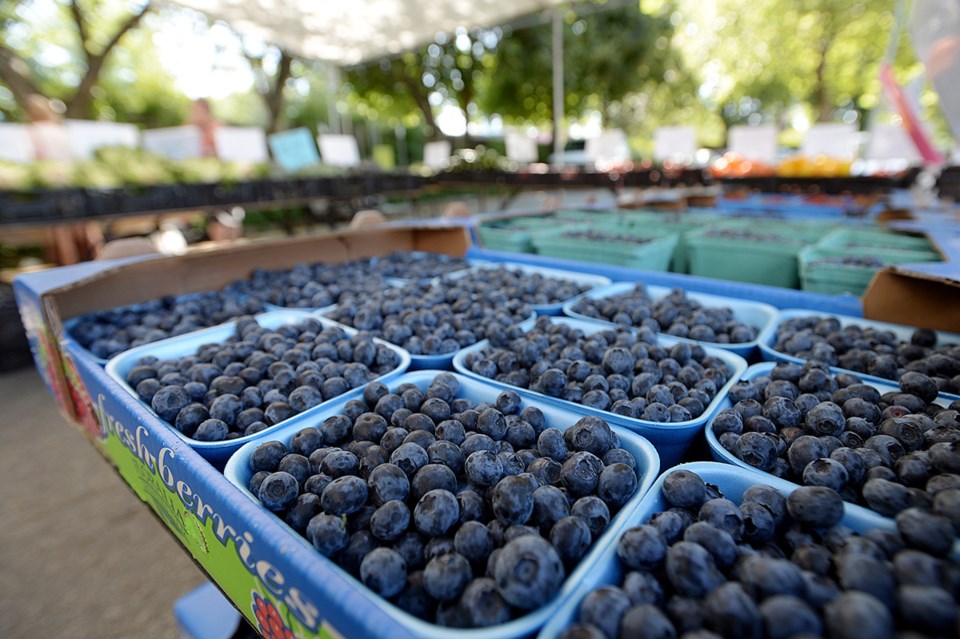It’s hot — stupidly hot in the city as I write this. The heat is affecting my mood, and it’s making me anxious about my dinner plan. Whether you’re ready to attribute this record breaking dry spell to climate change, or still want to chalk it up to weather anomalies, the truth is it’s having an impact on our local food systems. Most local crops are early, and high temperatures are threatening some harvests. From salad greens and berries in the city to local salmon stocks in nearby waters, what’s on your plate this time of year has changed.
Vancouver urban farmer Ilana Labow says her fields are six weeks ahead of schedule in the harvest. Labow’s Fresh Roots Urban Farm Society partners with the Vancouver School Board to provide educational farms at schools. The food grown is sold into the school community via school cafeterias, food access programs and markets. When I met Labow in 2009, she was a recent transplant from Chicago. I asked her what it was like to be growing here in Vancouver. She smiled and glanced up at the heavy cloud cover and said, “It’s good. I’m learning how to grow without sunlight, that’s all.” Five growing seasons ago, that was an astute joke. This year, Fresh Roots is having to adapt their season, starting programs ahead of schedule and hiring help earlier.
As anyone who dared to blink in June knows, the strawberry season came early and is done. Blueberries are now at their peak, and Randy Hooper of Discovery Organics, a local produce house that deals with many B.C. farms, says blueberry crops are ripening quickly, with several varietals all ready at the same time. This will mean lower prices, which is good for us shoppers, but bad for the bottom line of local farmers. It also means the season will be shorter than normal, as each varietal is intended to ripen consecutively to extend availability. Get them and freeze them while you can.
If you’re looking to pick wild, Cease Wyss, a local indigenous ethnobotanist and food security activist has noted some berries actually drying right on the bush. She’s hopeful by the time the salal berries arrive, we’ll have had rain.
At sea, the salmon return could be affected. Sonia Strobel is managing director of Skipper Otto’s Community Supported Fishery. She works with 15 fisherman across B.C. In a recent update to CSF members, Sonia cautioned that hot dry weather means some river systems have water temperatures too high and water levels too low for salmon to make it back to spawn.
In Barkley Sound, 48,000 sockeye salmon already travelling upriver are expected to die before spawning. Meanwhile, the rest of the Barkley salmon are circling in the Sound, waiting for a good rain to raise river levels and cool the water. “If we don’t get some good rainfall and if we have low spawning numbers, then we can expect a lower return of sockeye salmon in 2019,” Strobel explains, “and we can expect it to take two or three four-year cycles for the numbers to recover to their normal levels.”
Last week, Metro Vancouver raised water restrictions to level 2, a level that asks for voluntary reductions on things like lawn watering. An increase to level 3 would see restrictions on backyard garden watering, and if we hit level 4, even commercial farms would be cut off. Maybe this can be a wake-up call. We need our provincial government to better protect our water supply so that drier years in the future won’t be compounded by maddening corporate deals, like the one Nestle currently utilizes to extract one million litres of water from B.C. annually for the fee of $2.25.
While reducing our water consumption is an immediate concern, we also need to think about protecting our local food system. Right now, for those so inclined, it would be appreciated if you would pray for rain.
More practically, we can go to the market or grocery store to buy whatever local crops we see, and freeze or store what we can. Let’s make sure local producers have a market for any bumper crops the heat causes. Then, invite the neighbours over for a local food themed dinner, pull out your smartphones, and send Premier Christy Clark a tweet or two demanding a food security strategy for B.C.
@trishkellyc



